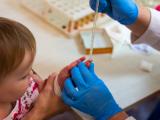Mar 17, 2010 (CIDRAP News) – Requiring healthcare workers to get vaccinated against influenza is one effective way to boost their vaccination rates, and another may be to target immunization messages to workers who are relatively isolated from coworkers, according to reports being presented this week at a conference on healthcare-associated infections.
Flu vaccination has long been recommended for health workers as a way to protect themselves and their patients and coworkers, but immunization rates have hovered in the 40% range for years. Three reports on the issue were released today by the groups sponsoring the Fifth Decennial International Conference on Healthcare-Associated Infections, which will run from Mar 18 to 22 in Atlanta.
The meeting is sponsored by the Society for Healthcare Epidemiology of America, the US Centers for Disease Control and Prevention, the Association for Professionals in Infection Control and Epidemiology, and the Infectious Diseases Society of America.
Mandated vaccine
Hospital Corporation of America (HCA), a leading healthcare chain, reported that it raised its employees' flu immunization rate to nearly 97% by requiring vaccination for the 2009-10 season.
Jonathan Perlin, MD, PhD, HCA's chief medical officer, said flu vaccination is important for health workers because a person can transmit the virus for 24 hours before having any symptoms. Speaking at a press conference held last week in advance of the Decennial meeting, Perlin also cited a study suggesting that 50% of flu-infected health workers have no symptoms.
HCA's policy required all employees to be vaccinated. Those who could not be immunized because of an egg allergy or history of Guillain-Barre syndrome or refused for nonmedical reasons were reassigned to non-patient contact roles or required to wear surgical masks, according to a press release.
"Nearly 97% of our healthcare workers have been vaccinated, and the remaining 3% are wearing masks, supporting our goal of 100% safety," said Perlin. "The response from our employees has been overwhelmingly positive; they appreciate knowing they're protected from being infected by a sick coworker or patients."
Workers vaccinated under the mandate numbered about 150,000, HCA reported. The chain has 163 hospitals, 112 outpatient clinics, and nearly 400 practices.
HCA previously used a combination of education, conveniently offered immunizations, and declination forms to induce workers to get their flu shot. These tactics yielded modest improvements but were inadequate for complete patient safety, the press release said.
The mandatory policy was developed by representatives of many disciplines. It was accompanied by prevention efforts such as promoting cough etiquette, proper hand hygiene, sick-visitor guidelines, and environmental cleaning, HCA reported.
"We believe that programs such as ours will become standard of care," Perlin said.
Not-quite-mandatory vaccine
At Children's Mercy Hospital and Clinics in Kansas City, a less coercive approach—requiring employees either to be vaccinated or to decline in writing—boosted vaccination coverage to 90.5%, according to Robyn Livingston, MD, the hospital's director of infection control and prevention.
The hospital's immunization rate in 2004 was 63%. The system introduced the vaccination/declination policy in 2008, which increased coverage to 85% that year, according to a press release.
For the 2009-10 season, officials stiffened the policy by adding consequences, including a forced leave of absence, for those who didn't take the vaccine or formally decline. As a result, the vaccination rate rose to 90.5%, and 98.8% of workers complied with the policy.
"Even though this program has exceeded our expectations, we recognize there is still room for improvement," Livingston said in the press release. "We are considering a fully mandatory influenza vaccination policy to begin next fall."
Vaccinated-coworker approach
In another study featured at the meeting, researchers from University of Iowa Health Care in Iowa City said they determined that health workers were more likely to be vaccinated if their near coworkers were vaccinated.
Donald Curtis, a graduate student in the university's Computational Epidemiology Research Group, used data from the university's electronic medical record system to assess employees' level of interactions with coworkers and determine their vaccination status. The data were stripped of personal details but included login times, locations, and vaccination status.
"We found a significant association between vaccination rates and healthcare workers who worked closely with other vaccinated workers," Philip Polgreen, MD, an assistant professor at University of Iowa Health Care, said at the press conference.
Employees "were more likely to be vaccinated if their closest coworkers were vaccinated," he said. "We think our results may be able to help inform hospital vaccination campaign strategies."
Polgreen cautioned that the social patterns inferred from the data are only a proxy for actual social interactions, since the strength of relationships was estimated from the frequency of being in the same part of the hospital at the same time.
He said the research team gathered data on employees' job classification and type and whether or not they were in patient care, but didn't assess the effects of other possibly relevant variables, such as age.
See also:
Oct 10, 2008, CIDRAP News story "APIC seeks mandate for flu shots in health workers"




















